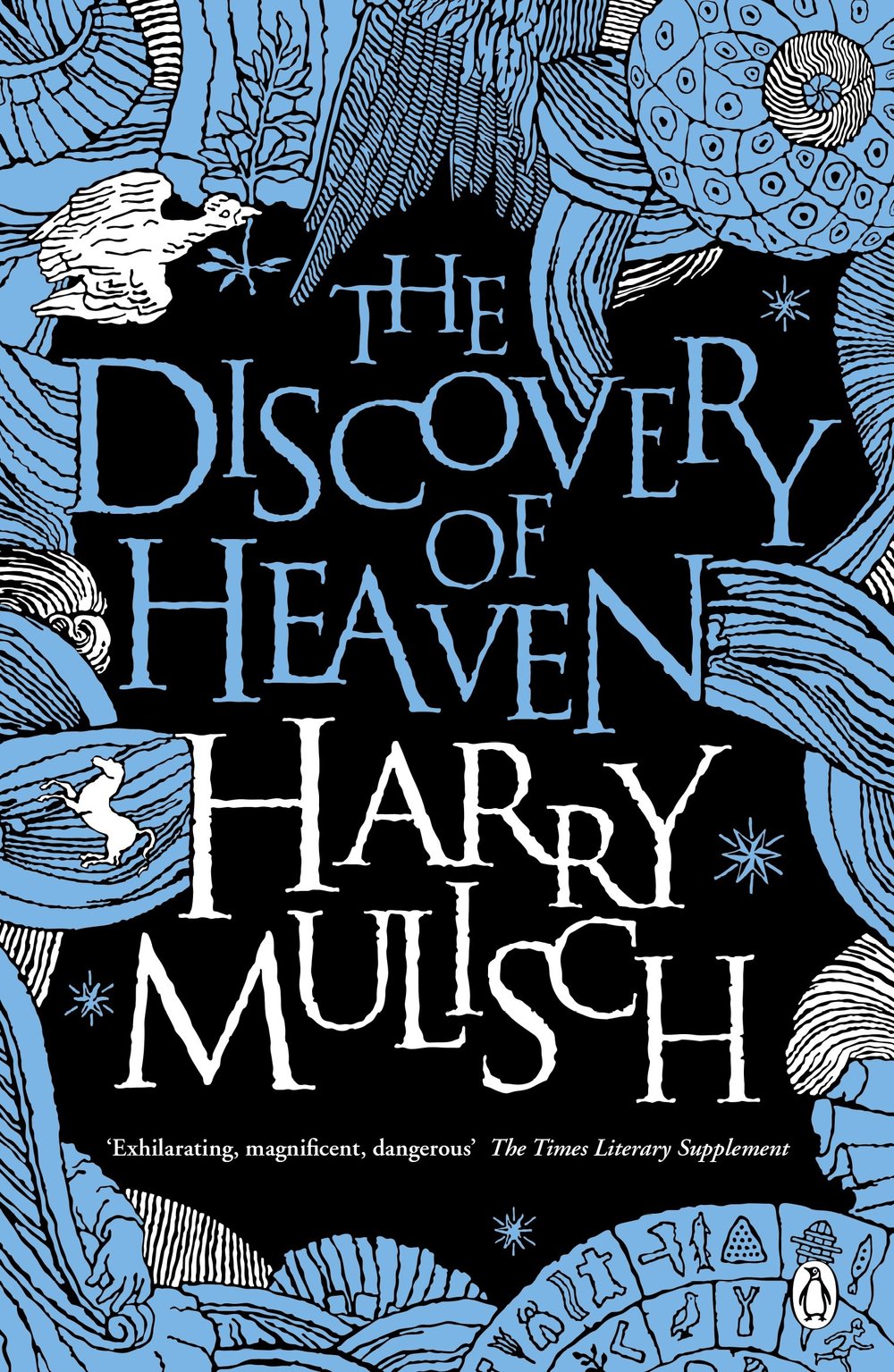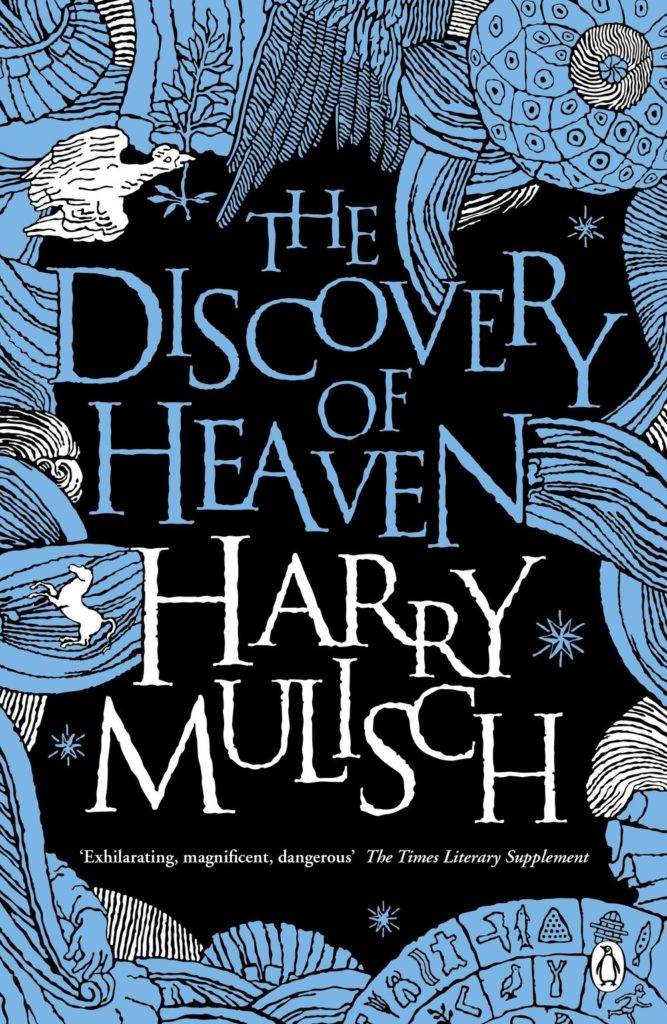
I do not want to begin another text using one of the three most predictable openings – a rhetorical question, a quote and an anecdote – but I am afraid I will have to sign a Faustian pact with one of these three devils once more, because I am bound to squeeze a 905-page book into an encapsulation of no more than 2 leaves. And what a book it is, indeed! Its author, Harry Mulisch, hailed as a member of ‘The Holy Trinity’ of the 20th-century Dutch literature along with Gerard Reve and Willem Frederik Hermans, has accomplished a feat, which surely grants him a place in the pantheon of classic writers, on the omnipresent, absolute, canonical floor, among giants like Tolstoy, Joyce, Mann, Dostoevsky, to name but a few. The Discovery of Heaven, a toughie itself when it comes down to any possible question which could crack open its indestructible surface to let us out and exhale at least a tiny fraction of complexity and knowledge stored inside its cavernous body, a monument due to a certain ‘story-ness’ written with a capital “S”, dominating other books by the scale, scope, range and reach of the matters dealt with on its pages, and, last but definitely not least, a certain embodiment of ‘longing’, belonging to the unfulfilled ways of history to chart itself differently, alternatively, without causing the indescribable metaphysical sadness of standardized irreversibility of subsequent zeitgeists… All right, enough of this lengthy recital! Mefisto, where are you?! I have already cut my finger and drawn some ink for a signature!
It is going to be one of those short questions, whose source I cannot recollect, unfortunately. It may have something in common with a particular passage from Lem’s His Master’s Voice or it is likely to have originated in a sheer speculative area of non-existent thoughts. The thing is rather simple: what throws a given entity into a state of ‘self-lockdown’, complete unreachability, noumenal bondage, and could we, in the following case, ask not only about any ‘what’ at all, but also about the justification of an unclear, skittish sensation that ’’’something’’’ in there (triple quotes to stress the extraordinarily trifle conventionality and blankness of the term “something” here) would turn out to be ‘overdivinely’ amazing, if we pierced right through the barricades that encircle it? Perhaps The Discovery of Heaven would serve us as a nuclear missile to tear down these walls (no Gipper allusions intended)? Or is Mulisch’s magnum opus itself the thing-in-itself from beyond Godlike astonishments?
Where to begin?… The characters perhaps. They are the most approachable elements of The Discovery of Heaven, which prevent us from getting lost in the author’s own remoteness. Onno Quist, Max Delius, Ada Brons. The first one is a black sheep of a prominent, high-class family, which retains substantial connections in the Dutch political establishment. A quick-witted, snappy yet sometimes excessively eloquent Onno – a linguistic prodigy, a recipient of a honorary doctorate degree for deciphering the Etruscan language and a son of the former prime minister of the Netherlands – amuses us with his seemingly nihilistic disposition and over-intellectualized tirades about as many issues as there are nuances boiling inside a postmodern cauldron of the late 60’s highbrow western ruminations. The second man is nothing like the former. A hopeless hedonist and a pertinent pedant when chasing skirts and fighting off the second law of thermodynamics in his apartment, Max is a low profile astronomer by profession. In striking contrast to Onno, his family background (and he himself too) has been stigmatized by a tragedy no one sane would ever envy – Max’s father denounced his own wife, a Jew, to Nazi authorities during the World War II, for which he was sentenced to death after the war had finished, orphaning then twelve-year-old Max. Finally, Ada. Being twelve years both Onno’s and Max’s junior, she is a student of music conservatory in Leiden. A sensitive and talented cellist, her thoughts are often ridden with genteel touches of naivety as well as bouts of melancholic dreaminess. While Onno’s and Max’s kinship issues cover the most extreme variables of the family specter, Ada’s own can be situated in a rather ordinary middle section of cold-hearted, bossy mothers and subdued but noble-minded fathers. All in all, this trio and its sophisticatedly intertwined kismets, spanning over 18 years, create one of the most memorable and unsurpassable testimonies to the ultimate power of literature to narrate.
What is so momentous about the general mnemonic mementos in The Discovery of Heaven, then? All that the above mentioned characters are weaving before us via author’s pen. And when I mean “all”, I do not mean all. At all. What I have in mind instead is a Story (yes, this one has to start with a capital letter due to its nature [Tolstoy and Mann nodding appreciatively aside]), which attempts to cover most, if not all, of the profound ideas, phenomena, impressions, etc., which happen to shape each individual human being, more or less directly, after he/she has been thrown into the world. Fate, contingency, historiosophy, being, political affiliations, music, cosmology, evil, typography, architecture, speculations, death, contemporary physics, philosophy, euthanasia, memory, religions and, quite like a condor with a tremendous wingspan, floating graciously above all, God – all of this comprises the brainy pole of the novel. Its soulful pole, let’s call it that way, teleports us to spheres of loss, hope, friendship (or even post-friendship), dedication, devotion, love, suffering, sacrifice, withdrawal, ecstasy, and many more. To enumerate all would be too much. Yet we cannot refrain from counting, as some of them have been sketched only with a feeble strokes of charcoal (Mulisch was only a human being, after all…[was he really?]), others, on the other hand, form figurative paintings dripping wet with abundance of an oil paint. We recognize them, the lines, the shapes, the intensities. They come from our own lives – a truly divine collage of transience. Suddenly we are able to grasp a dim recollection of something. Is the memory impairing effect of metempsychosis waning? Has it been real? Have we already found our own Citadel, the Citadel beyond the center of the world, beyond the possible and impossible propositional abilities of any conceivable language, reality, divinity? This is the grandeur, the monumentality of Mulisch’s marvel – to use all that there is to create even more than has ever been before. To somehow make the divine ex nihilo mode of conception blush. To outsmart it big time and do not follow in Faust’s footsteps. That may sound all too simple, even banal, if not totally hubristic, but isn’t the simplicity, which lies behind all complexity, a domain of purest geniuses like the Dutch author himself, AFTER ALL (block capitals and no quotes this time to highlight the double significance and literality of the phrase “after all”)? And isn’t it true that when we look over the fence to see what is behind it, our noses are being automatically stuck up in the air?
I might have been wrong in the second paragraph, where I had put forward a question regarding certain unreachability of things(-in-themselves). Maybe we do not have to smash through trenches, ramparts or barriers of any sort to reach them, because their ‘in-itselfness’ is and has always been permanently accessible; it is our eyes that remained shut. Maybe we have not figured out yet how to open them correctly to make a genuinely brilliant discovery of such a neo-divine splendor, which, when compared to the previous inferences and perceptions of heaven, would make them look like the very center of hell? Maybe there is no need for any kind of investigation to burst open essences, not because the reality/God/whatever forbids us from doing so, but because we have to wait for a Spark bright enough, like lapis-eyed Quinten Quist, ‘letters’ readable enough, like future Joyces, Manns, Tolstoys, but also yet-to-come Pynchons, Kafkas, Ecos and Blanchots, movies visionary enough, like those few which I would not dare to list, because somebody would do it undeniably better than me – to navigate us through the seas of alternative realities, multitudes, offshoots, outgrowths, etc., which would simply greet us with open arms, awaiting our spectacular creations and groundbreaking discoveries – the archipelagos of new, pristine ‘substances’? I am certain that the magnificence of The Discovery of Heaven is in itself one of the first lighthouses leading us out of the much too regular, repeatable and reproachful environs of coastal waters. May our eyes have the courage and perseverance to spot the next guiding Spark on the horizon.
Amonne Purity




